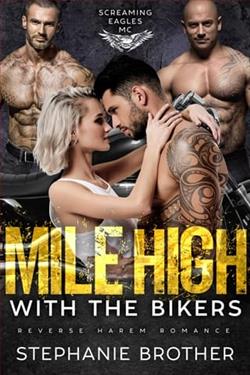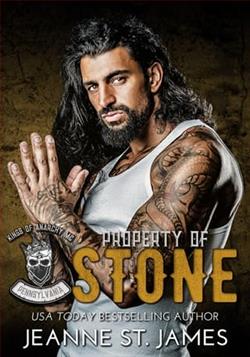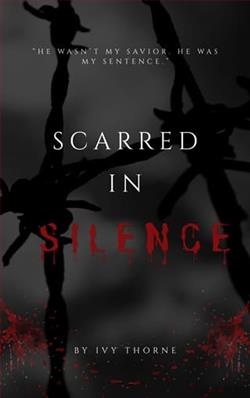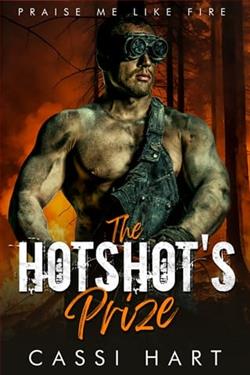Page 90 of The Children of Eve
“Minjun says that may not be enough if we’re under surveillance.” Minjun looked after Vaughn’s tech. Bern thought Minjun might beKorean, or half-Korean; honestly, he’d never cared enough to check. “He says they may be sweeping up every phone in the area. Whenever a new device is activated, it’s added to the list.”
“So where are you now?”
“Driving around, trying not to be overheard,” said Vaughn.
“You have someone with you?”
“Redcross and Arturas.”
Two of Vaughn’s people out of Maryland. Hard men.
“You could leave the city,” said Bern.
“You know, until you deal with Seeley, I figure I’m safer where I am. I now have federal bodyguards. They have a vested interest in not seeing me butchered.”
More was now known about the catastrophe in Loudoun County. The bodies of Hul and Harriet Swisher had been recovered from what was left of their home, the latter’s body less ravaged by flames thanks to the protection offered by the basement.
“Clemmie Dolfe says Harriet Swisher’s heart was cut from her body, just like Emmett Lucas’s,” Vaughn told Bern. “Hul was too badly burned to tell for sure. You think this Seeley is the cutter?”
“Could be.”
“You sound unsure.”
“If he’s doing the carving, it’s on Blas Urrea’s orders. But from what I’ve learned about Seeley, I don’t believe he goes in for showmanship.”
“Then it’s the woman,” said Vaughn. “When you find them, have both their fucking hearts cut out, and we’ll ship them to Mexico.”
“You want me to call when it’s done?”
“It would help me sleep better,” said Vaughn. “But keep it short, bearing in mind who might be listening.”
BERN AND DOAK LEFTthe main road and headed into countryside dotted with community churches—Baptist for the main part, with someMethodists thrown in for variety—and family homes, the grass neatly cut and the yards tended, even when the houses themselves looked run-down. God’s country, reflected Bern, as long as God’s idea of a good time was dinner at Olive Garden or Texas Roadhouse, and a round of golf at Crockett Ridge on weekends.
Seeley’s place was way out on Boozy Creek Road, the creek itself running alongside at intervals, the land hilly and wooded. Passing motorists waved greetings, and Doak raised a hand in return because to do otherwise might have caused them to lodge in someone’s mind. Meanwhile, the road was partly sponsored by the Boozy Creek Chapter of the Peacemakers Motorcycle Club, which didn’t make Bern any happier. He didn’t want bikers getting in his way or taking a proprietorial interest in traffic crossing through their territory. He was grateful that, once they were done, Doak’s vehicle would be returned to the dealership from which it had been borrowed and the original plates restored.
They stopped in the empty parking lot of Gardner’s Memorial Primitive Baptist Church, where Boozy Creek Road intersected with Tri State Lime Road. Bern didn’t know any Primitive Baptists, but if regular Baptists were anything to go by, these ones would be no fun at all.
“I went to a church like that when I was a boy,” said Doak. “In summer, we had Black Flag spray guns and fly swatters to deal with the insects. You have flies in your church?”
“I don’t recall many flies,” said Bern. “But I’m Catholic, so maybe flies are strictly a Protestant scourge, on account of that wrong turn you took at the Reformation.”
But Doak wasn’t paying attention. He was lost in the past.
“In winter, we tried to stay as close as we could to the potbellied heaters,” he continued. “Whenever I sweat or freeze, I think of God.”
“Given the things you’ve done since then,” said Bern, “you’d better hope God has forgotten you ever existed. Head on up a ways. I think we’re nearly there.”
Farther along Boozy Creek Road, they arrived at a cut on the leftmarkedPRIVATEandDEAD END. The gradient made it hard to see what lay ahead. Bern checked the Google Maps screen grabs he’d saved on his now SIM-less smartphone.
“This is the one,” he said, and Doak made the turn.
“I don’t reckon any of these houses are occupied,” Doak observed as they drove down the patched blacktop toward Seeley’s farmhouse, and Bern thought he might have been right. The homes that weren’t boarded up were gone to seed, with filthy glass in the windowpanes and slates dislodged from the rooftops. No flags fluttered from porches and no vehicles were parked in sight. In one of the yards stood a metal post with a chain extending from it, where a dog might once have been secured. It wasn’t as though Bern had never encountered similar signs of abandonment in his travels—poverty was more noticeable the farther south one ventured—but this neglect had an air of contrivance about it. He wondered how much a property along this road might cost a person, and supposed it depended upon the value they placed on their privacy. He had an idea that with committed digging, the ownership of the houses and their surrounding acres might be traced back to businesses and accounts linked to the Nashville Codex Company, or even Eugene Seeley himself.
Now here was the farmhouse, the last on the road, where blacktop turned to dirt before the whole was swallowed by undergrowth and the waiting woods beyond. The original single-story dwelling had been augmented over the years, with no great care taken to blend old and new. A second floor had been added the way a child might have worked with LEGO: by sticking a square on top of the existing rectangle, not even bothering to match the windows, before sourcing an overornate gable from the bottom of the box and jamming it into place in some misguided nod to architectural niceties. This was a building to be lived in, not admired. It was also shielded by glades of mature trees—another manifestation, perhaps, of the care taken by Seeley to guard against unwanted attention, though there was no longer a call for suchvigilance. The neighbors were all gone, leaving Seeley to reside unmonitored and unmolested.
Doak pulled directly into the driveway, the two men having decided that if Seeley suspected they were coming, he would either be waiting for them or already gone. If the second, they had nothing to fear. If the first, a cautious approach wouldn’t do them any good, just as there would be no advantage to waiting until dark, Seeley being more familiar with the lay of the land, night or day, than they were. Both men had taken the precaution of adopting body armor, especially after their brief encounter with the late Mertie Udine. Beneath their casual jackets, they wore EnGarde vests, though without the additional hard plates because Bern didn’t picture Seeley as the assault-rifle type. He did make him for a practical man, which meant Seeley wouldn’t be trying for head shots; that nonsense was only for video games. In real life and up close, you aimed for the largest target: the torso. Even then, amid the noise and terror of a gunfight, there was a good chance of missing entirely, which was why numerical advantage counted.
Just to further improve the odds, Bern had broken out a tactical shotgun, the ever-reliable Benelli M4, while Doak had added a shoulder stock to his Glock 18 along with a thirty-three-round magazine. Bern thought the shoulder stock was showy and thirty-three rounds counted as overkill, but there was no reasoning with younger people. Anyway, it wasn’t as though they planned to sit Seeley down and discuss the error of his ways. No, the intention was to leave Eugene Seeley so ripped apart that anyone else who might be tempted to assist Blas Urrea in his endeavors would first seek alternative ways of dying. To reinforce the point, pictures of what was left of Seeley would be circulated, a reminder that Devin Vaughn might have taken some punches but was far from out. Vaughn’s gag about Seeley’s heart might not be so far from the mark, either, though they’d have to include his head as well, just to eliminate any doubt.















